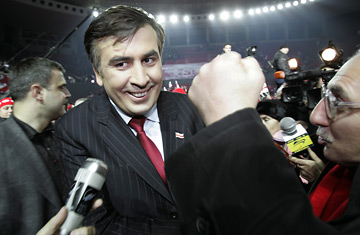
Mikhail Saakashvili is greeted by his supporters
Slipping from 96% of the vote in the January 2004 Presidential election to 51.96% four years later, in Saturday's national vote, signifies a dramatic drop for Georgian President Mikheil Saakashvili.
Back in 2004, the people swept Saakashvili into power as the Prince of the Rose Revolution — a mass upheaval that overthrew the previous regime. The people hoped against hope that Saakashvili — young, strong, incorruptible and U.S.-educated — would redress the numerous ills of this small former Soviet republic, devastated by almost two decades of civil wars, the loss of three provinces, mass poverty, and bullied by its erstwhile Imperial master Russia.
Now, however, the electorate has taken a more realistic view at what Saakashvili, 40, has accomplished in these four years — and what he has also failed to deliver.
Saakashvili had a lot going for him. In the Parliamentary March 2004 election, his National Movement-Democrats party carried 68% of the vote to dominate the legislative body. Both the U.S. and the E.U. saw him as "a beacon of democracy in that part of the world," as President George W. Bush put it on his visit to Tbilisi in May 2005. With that kind of domestic and international support, he launched comprehensive economic reform, restoring to the people such long forgotten luxuries like electricity, heat and water supplies.
In 2006, as Georgia's GDP grew by 9.6%, the World Bank named Georgia the top reformer in the world. Its officials forecast growth of 14.5% in 2007. The Georgian government boosted revenues by tightening up the administration of the tax system. Private investment went up and there has been a crackdown on corruption. Per capita income is up from $700 a year in 2003 to the current figure of $1,500. The most astonishing achievement was Saakashvili's reform of the traditionally corrupt police forces. He disbanded the entire Ministry of the Interior — with recruitment based on the western testing system. It may come as a joke to those who remember the old Georgia, but most police do not take bribes now — they're well paid and their jobs are too respected to be lost in ignominy.
In May 2004, Saakashvili went out of his way to convince Russian President Vladimir Putin that he could serve as a go-between to hammer out an acceptable balance of American and Russian interests in the Caucasus. This let Saakashvili restore Ajaria, one of the breakaway and Moscow-oriented provinces, to Georgia's central authority, as Putin gave it up as a test of Saakashvili's intentions. At that, however, Saakashvili's luck seems to have run out: Russia firmly controls Abkhazia and South Ossetia — the other two breakaway republics, with no intentions of giving them back, and keeps turning up the heat on a Western-leaning Georgia, since September 2006, by severing mail and transportation links between the two countries, closing Russian markets to Georgian wine and other key exports. Many Georgian businesses got closed in Russia, with Georgians rounded up and forcibly deported. The Russian Embassy was withdrawn from Tbilisi, coming back only in January 2007. Georgian ships were denied the right of entry to Russian ports. Natural gas prices, raised from $110 up to $235, sealed the tight economic blockade clamped on Georgia.
The failure to return the lost territories seriously undercut Saakashvili at home. Many began to grumble about his reform not improving their living conditions fast enough. Complaints arose that his macro-reform was adversely affecting ordinary businessmen and traders. A crackdown on the black market in cigarettes and alcohol left thousands of street vendors without jobs. Growing incomes are offset by rising inflation and these reforms have made many Georgians pay tax and utilities bills in full. The government is also dramatically increasing the defense budget instead of raising pensions. The opposition, represented by nine parties, invoked Saakashvili's increasingly authoritarian style of management.
The opposition also alleged corruption and crime in Saakashvili's own team. The real bombshell came in September 2007, when Irakli Okruashvili, once Saakashvili's closest confidant and Defense Minister, publicly accused the President of ordering a political murder. Okruashvili also claimed that the popular Prime Minister Zurab Zhvania, whose mysterious death in January 2005 was officially explained by a gas leak, was in fact murdered. These allegations have been denied by Saakashvili.
As opposition protest rallies were attracting growing numbers of people, Saakashvili's nerve snapped. In November, he ordered his riot police to crack down, using tear gas and rubber bullets, and clamped the stage of siege on Georgia.
With even his staunch Western supporters deploring that decision, Saakashvili sought to restore his democratic credentials by lifting the stage of siege, resigning and calling a snap Presidential election, which he now appears to be winning by the skin of his teeth in the first round. This would be crucial as going into a run-off could have proved his undoing.
The opposition charged the election was rigged — and promised a non-stop protest action as of Tuesday, January 8, once the Orthodox Christmas is over. The opposition action will hardly result in another revolution of Roses — but it has a strong chance of inflicting on the now weakened President a crushing defeat at the Parliamentary election, coming in the Spring of 2008. The bottom line, though, is that Georgia's fledgling democracy is making significant steps forward in this test of wills, as both the pro-government and opposition forces firmly align themselves to Western democratic values.
